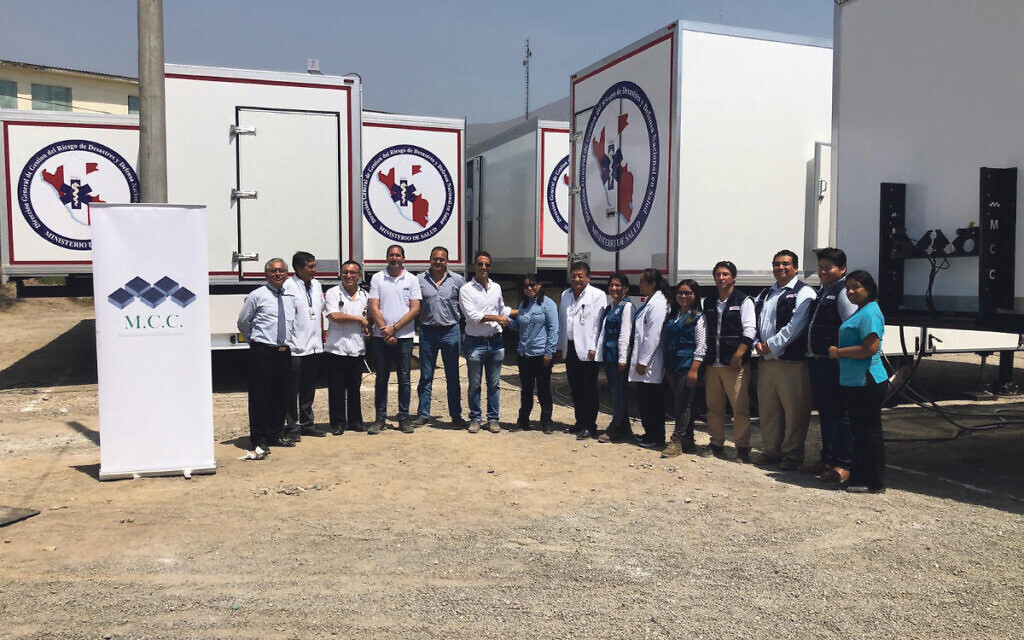The entrepreneur fighting the outbreak
As the coronavirus spreads, Terry Newman has made it his business to meet just this kind of challenge, writes Candice Krieger

A former chief of staff to Lord Janner, Terry Newman is the director of MCC London (www.mccgrouplondon.com), a medical consultancy and construction group that specialises in the planning, design and execution of turn-key modular, stationary and mobile hospitals across the globe.
The company has recently completed the installation of ten mobile hospitals to the Ministry of Health in Peru where they have been used to screen and treat the people for the new coronavirus, Covid-19.
“MCC London is honoured to serve the people of Peru,” says Newman, 38. “We have provided 10 world-class mobile facilities that are providing medical services to tens of thousands, including fighting the coronavirus. We designed, built and installed all ten hospitals in nine months – a remarkable achievement. These hospitals are fully mobile yet provide a high level of medical treatment. We are proud that these hospitals have significantly improved the ability of Peru’s MOH to expand their reach and reduce their response time to health crises as they occur.”
Get The Jewish News Daily Edition by email and never miss our top stories Free Sign Up
Newman is now in talks with various other health authorities throughout the globe in order to find solutions in deliverable and realistic time. “Our ethos: MCC is in the business of saving lives and we will do everything we can to help as many people as we can.”
He continues: “The main message from a health perspective that we want to bring is that corona is a serious threat and that it needs to be dealt with and we praise the various health authorities around the world for taking immediate action. However, we can see that a lot of the disease is being spread because of globalisation through airplane travel. People are not being checked when they get off the plane, they are being checked when they get into the airport terminal which is madness.

“In Peru we have deployed the hospitals on the runway so if there are people that are question marked and need to be checked, they are checked before they even reach the terminal which is a much safer and better way of doing it.”
A former strategy consultant at McKinsey, Newman founded MCC London in 2007. “I was living in Egypt and I was a big believer that the way to build relations between countries was not through altruism but through business.”
He started bringing leading Israeli technologies into the Arab world including in agriculture and healthcare. MCC grew out of the work they were doing in the healthcare space.
They have completed hospital projects throughout the world, focusing on helping armies and governments deal with natural disasters, tsunami / floods, earthquakes, population displacement, disease control, peacekeeping, anti-terrorism measures and demonstrations.
The coronavirus continues to dominate the news – and global markets; stocks are plunging, pensions have taken a big hit, and the odds of a global recession dramatically shortened.
And as the virus continues to spread, surely the current hospital system won’t be able to cope with the disease? “Absolutely,” says Newman. “There is a curve. On the ‘x axis’ you have time, and on the ‘y’, the amount of infection. What normally happens with an infection is that you have a bell curve – a very steep inverted U – and what that means is that if you have huge amounts of people getting ill very quickly, there’s not enough hospital beds and they are trying in effect to flatten out that inverted U, so instead of a really steep inverted U, it’s more like a stretched out ‘n’, and that way, there is less immediate pressure on the hospital beds and you are more likely to save people. The most at risk are the elderly and the ill and we have to do our best to try and save these people.”
A former Haberdashers’ Aske’s pupil, Newman studied Oriental Studies at the University of Oxford. He acknowledges that the coronavirus will undoubtedly have prolonged and far-reaching implications, accelerating some general trends in the world economy and beyond. “One, people are going to be ordering more and more food online. For many it might be the first time they have ever done it, but once they start doing it they will probably continue to do so. Two, companies will get used to staff working from home and three, people are going to start looking at their supply chains, not just from a perspective of where is the cheapest to manufacture but also where it safest, and safe is going to involve medical and geopolitical considerations as well.”
Newman refers to a 2015 Ted Talk by Bill Gates. “He [Gates] warned against exactly this – the outbreak of a serious virus that would not make you ill for the first week and so would spread rapidly. His prediction, which we fully accept, was that more people are going to die this century from infectious diseases than from war, yet government still spend trillions of dollars on their militaries and virtually nothing on preparing for infectious diseases.
“Governments need to think more militarily about how to fight infectious diseases. You have to have both trained doctors that are ready and medical teams in reserve duty that can be called up. You have to have weapons, i.e. isolation rooms, mobile hospitals, masks, vaccines, everything needs to be ready, and you need to do war games with germs. And if anything like this breaks out, they have to in effect get all their ‘soldiers’ together with all their weapons and work together with the military themselves on the logistic side.
“This needs to be taken more seriously and I think this will be a long-term change in the way the governments relate to these issues.”
- Newman is also chairman of Israel’s leading modular construction company, Isramarin Modular Construction Ltd (www.isramarin.com ).

Thank you for helping to make Jewish News the leading source of news and opinion for the UK Jewish community. Today we're asking for your invaluable help to continue putting our community first in everything we do.
For as little as £5 a month you can help sustain the vital work we do in celebrating and standing up for Jewish life in Britain.
Jewish News holds our community together and keeps us connected. Like a synagogue, it’s where people turn to feel part of something bigger. It also proudly shows the rest of Britain the vibrancy and rich culture of modern Jewish life.
You can make a quick and easy one-off or monthly contribution of £5, £10, £20 or any other sum you’re comfortable with.
100% of your donation will help us continue celebrating our community, in all its dynamic diversity...
Engaging
Being a community platform means so much more than producing a newspaper and website. One of our proudest roles is media partnering with our invaluable charities to amplify the outstanding work they do to help us all.
Celebrating
There’s no shortage of oys in the world but Jewish News takes every opportunity to celebrate the joys too, through projects like Night of Heroes, 40 Under 40 and other compelling countdowns that make the community kvell with pride.
Pioneering
In the first collaboration between media outlets from different faiths, Jewish News worked with British Muslim TV and Church Times to produce a list of young activists leading the way on interfaith understanding.
Campaigning
Royal Mail issued a stamp honouring Holocaust hero Sir Nicholas Winton after a Jewish News campaign attracted more than 100,000 backers. Jewish Newsalso produces special editions of the paper highlighting pressing issues including mental health and Holocaust remembrance.
Easy access
In an age when news is readily accessible, Jewish News provides high-quality content free online and offline, removing any financial barriers to connecting people.
Voice of our community to wider society
The Jewish News team regularly appears on TV, radio and on the pages of the national press to comment on stories about the Jewish community. Easy access to the paper on the streets of London also means Jewish News provides an invaluable window into the community for the country at large.
We hope you agree all this is worth preserving.
-
By Brigit Grant
-
By Laurent Vaughan - Senior Associate (Bishop & Sewell Solicitors)
-
By Laurent Vaughan - Senior Associate (Bishop & Sewell Solicitors)
-
By Laurent Vaughan - Senior Associate (Bishop & Sewell Solicitors)
-
By Laurent Vaughan - Senior Associate (Bishop & Sewell Solicitors)





















